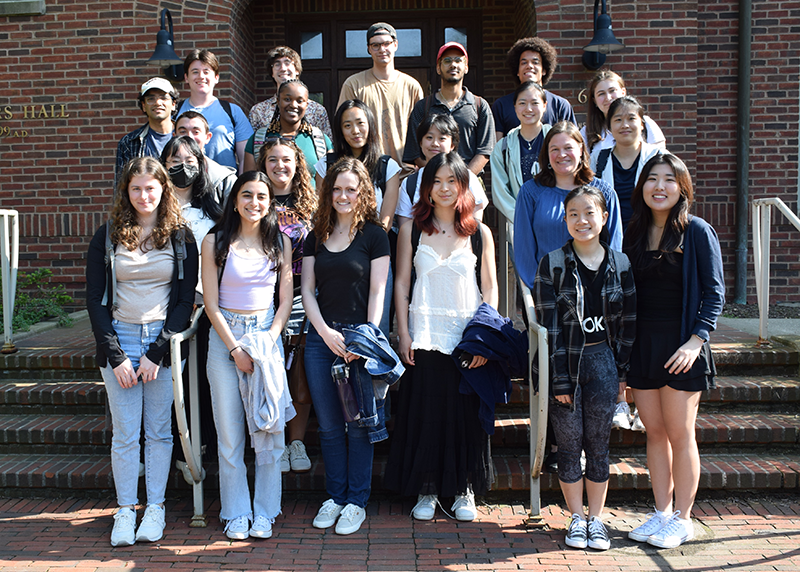Northwestern Undergraduates Learn How Research Can Address Social Issues
Students develop valuable research skills through projects addressing education inequality, democratic backsliding
Get all our news
One thing I love about the work is that I see real applications for the information we create, either in governmental policy or elsewhere.”
Inaya Hussain

IPR’s 2024 summer undergraduate research assistants take a photo during their training session.
Northwestern’s Institute for Policy Research (IPR) is helping to shape the next generation of researchers through its Summer Undergraduate Research Assistants (SURA) Program. Each summer, the initiative connects students directly with IPR faculty, giving them a chance to develop their research skills while tackling some of today’s most pressing societal challenges.
This year, 37 students joined the program, working on projects on critical social issues like education inequality and threats to democracy. SURA gives students more than research experience—it helps them see how their skills can make a real difference.
Sarah Abara: Turning Data into Impact
SESP senior Sarah Abara, majoring in data science and social policy, said working with IPR statistician Elizabeth Tipton gave her not only important insight into the research process and education policy, but also future career paths.
“I learned a lot from her. We communicated on more than just research. We communicated about future career goals, and she just really served as a great mentor for me,” she said.
Abara worked with Tipton to analyze testing data for K-5 students in the Evanston school district. The project aimed to identify and quantify disparities in achievement between Black students and their non-Black peers. “As a future researcher, it definitely illuminated my knowledge in the world of education policy,” Abara said.
Tipton said she enjoyed learning about Abara’s experience as a student and helping her think through different career trajectories. “It was fun to see her beginning to make connections between her coursework and her social justice interests, and to see how her skillset could be useful in the policy world,” Tipton said.
With graduation approaching, Abara noted that in job interviews, interviewers are often more interested in her research experiences than her work experiences because of the analysis, organization, and communication skills involved in research.
“Those are all things that are transferable to anything that you want to do in your future, whether it’s continuing to be a researcher or moving on a different path,” she said.
Abara is committed to a research career, as the SURA program has shown her both her passion for the process and the potential for research to drive change. Tipton highlighted the importance of such experiences for students like Abara in statistics and data science, noting that it can be challenging for them to see how their skills can influence social policy.
“My sense at Northwestern is that students who have strong quantitative skills are exposed often to career trajectories in consulting and business,” she said. “This program provides an opportunity for students to see an alternative path, one that allows them to combine their skills with their social commitments.”
For students who are on the fence about applying to SURA, Abara stressed the value of the program. “You need to do it. I would literally say that any student that is interested, definitely pursue this opportunity.”
Inaya Hussain: Learning the Nuts and Bolts of the Research Process
Weinberg junior Inaya Hussain, majoring in mathematical methods in social sciences and history, said working with communications and policy scholar and IPR associate Erik Nisbet deepened her understanding of the research process, particularly the time and effort required to organize data effectively.
“I also got experience with the iterative process of research. At lab meetings, we always talked about how we could tweak our past processes and try again for a more effective result,” she said.
Hussain worked with Nisbet on a range of projects focused on technology, media, and public policy. Her main projects included training an artificial intelligence program to identify misinformation around climate change, conducting a network analysis of online political groups to see how different ideologies connect, and gathering articles on democratic backsliding—when democratic systems start weakening and move toward more authoritarian rule—to develop a framework for media's impact on democracy. “One thing I love about the work is that I see real applications for the information we create, either in governmental policy or elsewhere.”
Nisbet also highlighted the program's distinctive ability to show students how research can directly influence policy, emphasizing its vital role in equipping students like Hussain with the skills and experience needed for meaningful, impact-driven research careers.
"The SURA program offers undergraduate students an exceptional opportunity to engage directly in policy-relevant research that truly makes a difference," Nisbet said. "This program is deeply rewarding—for students, who develop valuable research skills and knowledge while contributing to projects with real-world impact, and for faculty, who mentor young researchers and witness their growth into collaborators making meaningful contributions."
Hussain said her experience will continue to benefit her well beyond the program and her time at Northwestern. She believes research skills will always be valuable, as research is all about quickly adapting and processing large volumes of information, and, as she put it, “having the faith in yourself to be able to create knowledge if you can't find it anywhere else. My experiences this summer will help me through my life!”
Elizabeth Tipton is professor of statistics and data science and co-director of the Statistics for Evidence-Based Policy and Practice, or STEPP, Center. Erik Nisbet is the Owen L. Coon Endowed Professor of Policy Analysis and Communication and directs the Center for Communication & Public Policy. Both are IPR faculty.
Published: December 2, 2024.


